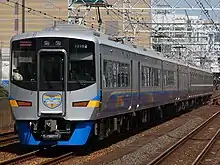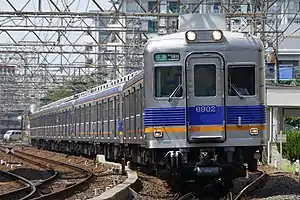 | |
Native name | 南海電気鉄道株式会社 |
|---|---|
| Type | Public KK |
| TYO: 9044 | |
| Industry | Ground transport |
| Predecessor | Nankai Railway Co., Ltd. (former parent company founded on June 16, 1884) |
| Founded | Kudoyama, Wakayama Prefecture, Japan (March 28, 1925, Koyasan Electric Railway Co., Ltd.) |
| Headquarters | Nankai Namba Building, Shikitsu-higashi, Naniwa-ku, Osaka, Japan Registered office: Namba Skyo, Namba, Chūō-ku, Osaka, Japan |
| Services |
|
| Revenue | |
| Total assets | |
| Total equity | |
| Owner | Nippon Life (2.19%) Senshu Ikeda Bank (1.41%) Keisei Electric Railway (0.3%) |
Number of employees | 2,734 (March 31, 2012) |
| Subsidiaries |
|
| Website | nankai.co.jp |
Footnotes / references
| |

Nankai Electric Railway Co., Ltd. (南海電気鉄道株式会社, Nankai denki tetsudō kabushiki gaisha) is a private railway in Japan, founded in 1884. The name Nankai (which means "South Sea") comes from the company's routes along the Nankaidō, the old highway that ran south from the old capital, Kyoto, along the sea coast. Nankai predates all the electric railways in the Tokyo region.
The Nankai network branches out in a generally southern direction from Namba Station in Osaka. The Nankai Main Line connects Osaka to Wakayama, with an important spur branching to Kansai International Airport. The rapi:t α express connects Kansai International Airport to Namba in 34 minutes, while the rapi:t β takes 39 minutes with two additional stops. The Koya Line connects Osaka to Mt. Koya, headquarters of the Buddhist Shingon sect and a popular pilgrimage site. IC cards (PiTaPa and ICOCA) are accepted.
History

The Nankai Railway Company was founded on June 16, 1884. In 1944 it was one of the companies that merged to form Kinki Nippon Railway Co., Ltd. (Kin-nichi, present Kintetsu Railway). However, Kin-nichi transferred the former Nankai Railway Company's lines to the present Nankai Electric Railway Co., Ltd. (named Koyasan Electric Railway Co., Ltd. from March 28, 1925 until March 14, 1947) on June 1, 1947.

From 1938 to 1988, Nankai Electric Railway owned the Nankai Hawks, a team in Nippon Professional Baseball that was based in Osaka. The team was sold to Daiei after the 1988 season and moved to Fukuoka and rechristened the Fukuoka Daiei Hawks. The team was sold again in 2005 to SoftBank, and are now the Fukuoka SoftBank Hawks.
Lines
 Nankai Line (南海線)
Nankai Line (南海線)
- Nankai Main Line (南海本線): Namba – Wakayamashi
- Takashinohama Line (高師浜線): Hagoromo – Takashinohama
 Airport Line (空港線): Izumisano – Kansai Airport
Airport Line (空港線): Izumisano – Kansai Airport- Tanagawa Line (多奈川線): Misaki koen – Tanagawa
- Kada Line (加太線): Kinokawa – Kada
- Wakayamako Line (和歌山港線): Wakayamashi – Wakayamako
 Koya Line (高野線)
Koya Line (高野線)
- Koya Line (高野線): Shiomibashi - Kishinosato-Tamade – Gokurakubashi
- In operation: Namba - Gokurakubashi
- Shiomibashi Line (汐見橋線, commonly called): Shiomibashi – Kishinosato-Tamade
- Cable Line (鋼索線): Gokurakubashi – Koyasan
Defunct lines and transferred lines
- Nankai Line (南海線)
- Tennoji Branch (天王寺支線): Tengachaya – Tennoji (replaced by the Sakaisuji Line)
- Kitajima Branch (北島支線): Wakayamashi – Kitajima - Higashi-Matsue (abandoned)
- Wakayamako Line (和歌山港線): Wakayamako – Suiken (abandoned)
- Kishigawa Line (貴志川線, dealt with Wakayama Electric Railway Co., Ltd. (和歌山電鐵株式会社)): Wakayama – Kishi
- Osaka Tram Line (大阪軌道線)
- Hankai Line (阪堺線): Ebisucho – Hamadera-eki-mae (dealt with Hankai Tramway Co., Ltd.)
- Uemachi Line (上町線): Tennoji-eki-mae – Sumiyoshikoen (dealt with Hankai Tramway Co., Ltd.)
- Hirano Line (平野線): Imaike – Hirano (replaced by the Tanimachi Line)
- Ohama Branch (大浜支線): Shukuin – Ohama-kaigan (abandoned)
- Wakayama Tram Line (和歌山軌道線): Wakayamashi-eki, Wakayama-eki – Kainan, Shin-Wakaura (abandoned)
Rolling stock
Limited express trains
- 50000 series — used on rapi:t service between Namba and Kansai airport
- 31000 series — used on Kōya service between Namba and Gokurakubashi
- 30000 series — used on Kōya service between Namba and Gokurakubashi
- 12000 series — used on Southern service reserved car between Namba and Wakayamakō
- 11000 series — used on Rinkan service between Namba and Hashimoto
- 10000 series — used on Southern service reserved car between Namba and Wakayamakō
Nankai Line, Airport Line
- 9000 series — used on Southern service non-reserved car between Namba and Wakayamakō
- 8300 series — used on Southern service non-reserved car between Namba and Wakayamakō
- 8000 series — used on Southern service non-reserved car between Namba and Wakayamakō
- 7100 series — used on Southern service non-reserved car between Namba and Wakayamakō
- 3000 series — converted from former Semboku 3000 series
- 2000 series
- 1000 series
Kōya Line Commuter car (Namba-Hashimoto)
- 8300 series
- 6300 series — converted from former 6100 series
- 6250 series — converted from former 8200 series
- 6200 series
- 6000 series
- 1000 series
Kōya Line Zoom car (Namba-Gokurakubashi)
- 2300 series
- 2200 series — used on Tenkū service
- 2000 series
Takashinohama Line, Tanagawa Line, Kada Line, Shiomibashi Line
- 7100 series
- 2220 series
- 2200 series
Cable Line
- N10 / N20
 Nankai 50000 series on rapi:t service
Nankai 50000 series on rapi:t service Nankai 12000 series on Southern service
Nankai 12000 series on Southern service Nankai 10000 series on Southern service
Nankai 10000 series on Southern service Nankai 6000 series
Nankai 6000 series Nankai 9000 series on Southern service
Nankai 9000 series on Southern service Nankai 2000 series ("Zoom Car")
Nankai 2000 series ("Zoom Car") Semboku 3000 series
Semboku 3000 series